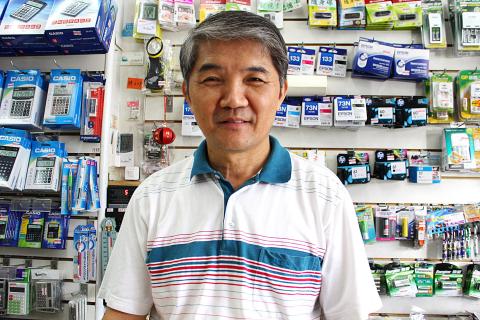|
Bookstore owners
criticize trade pact
FEELING SQUEEZED: Members of the stationery
sector said they already face stiff competition and if Chinese investors join
the market, they would have to close shop
By Ting Wei-chieh and Jake Chung / Staff reporter, with staff
writer

Chiayi County Books and
Educational Tools Guild director Lo Jen-tsai poses in his shop on Saturday. Lo
is concerned about the effects of the cross-strait service trade agreement on
the bookstore business.
Photo: Lin Yi-chang, Taipei Times
The Chiayi County Books and Educational
Tools Guild yesterday said it was unanimous in its opposition to the
cross-strait service trade agreement, saying that if the agreement takes effect
their industry would face immense pressure from Chinese competition.
According to data, the guild counted more than 200 members in its heyday more
than a decade ago, but now comprises only 80 members with a total of 1,000
employees.
Guild director-general Lo Jen-tsai (ù¤¯§÷) said he worried the agreement would
drive more traditional bookstores, which are already under pressure from chain
bookstores, out of business.
Most traditional bookshop owners already watch their own stores instead of
hiring security staff to cut back on their personnel expenditures, Lo said.
Competing against Chinese investors would be difficult for Taiwanese stores,
especially as the Chinese have more resources and can easily obtain good store
locations and handle complicated logistics, Lo said.
The possibility that Chinese investors may use their fat bank balances to
steamroll smaller Taiwanese bookshops should not be excluded, Lo said, adding
that should Chinese investors choose to invest in large chain bookstores, the
monopoly the chain bookstores have on the sales of books and stationery would
only solidify.
Pointing to how the many bookstores in Taipei¡¦s Chongqing S Road, known for its
high concentration of bookshops in the past, closed shop or were changed into
cafes, Lo said that Chiayi County could not be compared with Taipei in terms of
culture and education saturation.
There is a limited market and with Chinese investors barging in for another
slice of the pie, common bookstores would not last long, Lo said, adding that
the closing down of bookshops would bring staff layoffs and a higher
unemployment rate.
According to Chiayi City Books and Educational Tools Guild director-general
Huang Chuan-feng (¶À¤t®p), the stationery business was already very competitive and
Chinese investments would worsen the situation.
¡§Consumer habits have also changed, and our competitors now include hypermarkets
and other sources, featuring more choices in stationeries than bookshops can
offer,¡¨ Huang said.
Coupled with competitive pricing from those in the same business, there were
many other factors which determined whether a customer actually walked into a
store to make a purchase, Huang said.
¡§It is no longer the age where you sell it cheap and they will come,¡¨ Huang
said, adding that if Chinese investors were allowed to invest in Taiwan, ¡§you
can kiss the whole industry goodbye.¡¨
The guild¡¦s honorary director-general Tseng Chang-ting (´¿ªø§Ê) also said that due
to high wages, many manufacturers have shifted their plants to China for cheaper
labor overheads before transporting their wares back to Taiwan for sale, adding
that Chinese products were usually of low quality.
Giving examples, Tseng said that tape would not come off once you put it on and
uniforms made in China also had a common problem of colors fading fast.
Huang, whose store sells blackboards and whiteboards, also said that Chinese
products are inferior in quality.
Whiteboards are made to be durable, and Taiwanese whiteboards ¡X made using
techniques learned from Japan ¡X were not only safe, but also capable of standing
up to repeated use, Huang said, adding that whiteboards made in China were
usually done for within a month.
The manager of one of the older bookshops in Chiayi City, the Hung Tu Bookstore,
Kuo Hao-sheng (³¢µqª@), said that more than 70 percent of all stationery items in
the nation were manufactured in China and quality control was a constant
problem.
Every shipment of stationery is double-checked and unqualified products are sent
back, such as erasers made in colors that differ from the original or plastic
stationery cases that smell bad, Kuo said.
Taiwanese stores try to ensure that students and parents enjoy quality
purchases, but the price difference between Chinese and Taiwanese products ¡X
Taiwan-made plastic stationery cases may cost up to NT$59 per case, but Chinese
products sell for NT$39, or even NT$29 per case ¡X may be an indicator that
Chinese-invested stores may not take such precautions, Kuo said.
|
![]()
![]()
![]()